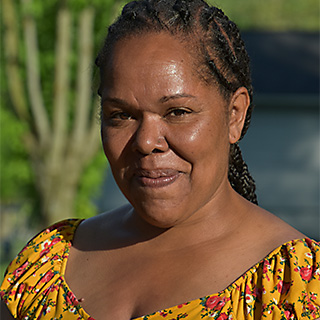American Ginseng - Ruby Daniels

Ruby Daniels epitomizes African American history in a region where it has long been invisible. Her family presence in Stanaford, West Virginia, dates to when William Crite, her formerly enslaved great-grandfather, came there to work in the coal mines. Crite and his descendants combined the wages of the mines with the fruits of the family’s seventy acres of forest, field, and streams. After Daniels’s parents left the coalfields in the mid-twentieth century, she grew up in Columbia, Maryland.
Daniels spent summers in Stanaford, under the care of her grandmother Fannie Shepherd, known in the community as a healer. “I was privileged to have a grandmother who was born in 1917 and lived ’til she was one hundred years old. She saw the world change. She was very verbal, and she loved to talk about old stories. Talking to my grandma about herbs was amazing.”
After earning a master of science degree in herbal therapeutics from Maryland University of Integrative Health, Daniels returned to Stanaford and started a company named Creasy Jane’s, after her great-grandmother. From the beginning, that work included recovering a place for African American herbal knowledge in narratives of Central Appalachia. “The Afrilachian piece has been hidden for so long. When I was in herbal school, I was taught that African Americans knew nothing of the herbs here, and the only way we learned about them was from Native Americans and Caucasians.”
Video by Clara Haizlett
Determined to address the silence on African medicinal and herbal knowledge in Appalachian history, Daniels studied the Slave Narratives from the Federal Writers’ Project. There she discovered parallels with distinctively African antecedents, such as the recognition and treatment of spiritual dimensions of illness and healing, a process in which the ancestors play a crucial role. Virginia law prohibited enslaved Africans to practice herbal medicine: “But we still did it. We just hid it.”
The Appalachian Mountains harbor many roots and herbs known to Daniels’s grandmother’s generation as efficacious for treating particular ailments. “They knew where the ginseng was, they didn’t really talk about them using it, but … about them going and digging and selling it to people.” Among African American communities, Daniels explained, ginseng did not have, for example, the stature of “High John,” a root whose name commemorates John, an enslaved cunning trickster who prevailed spectacularly in struggles against the master.

“I am not rare, because there are other African Americans that do go in the woods and work with the plants,” Daniels reflects. “But there are also many that do not get down with the woods. Because if we look at the history, even in slavery, they would be walking, and they would be allowed to go out as slaves in the woods. But if the wrong person caught you, or if you didn’t have a pass, and they just wanted to lynch you and beat you or rape you, there’s no safety there. So I do think it goes with the history of slavery. And then after slavery, the Jim Crow era … the government wasn’t really stepping in to save us. It’s still an issue now.”
Through her Afrilachian Forest Farming initiative, Daniels engages a long-term restoration project that integrates African American culture and history with the Appalachian forest. Like her grandmother, Daniels is a gardener, specializing in medicinal herbs and heritage vegetables, such as whippoorwill cow peas and iron-and-clay black-eyed peas. And like her grandmother, Daniels follows the African practice of planting on mounds. Daniels heals both forests and people through her care for the earth and its human communities.

